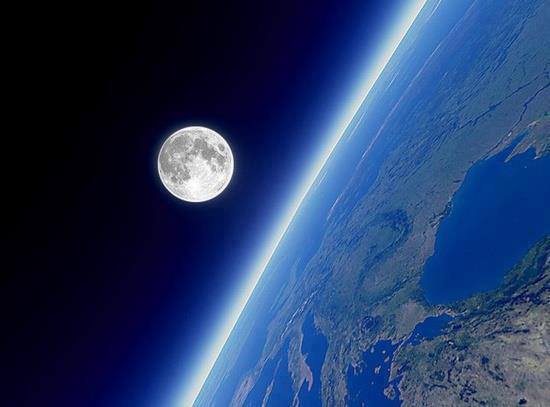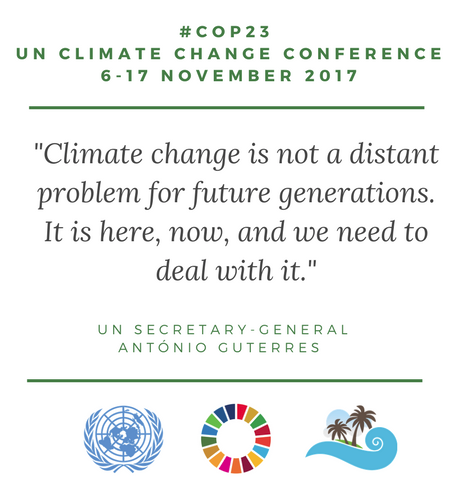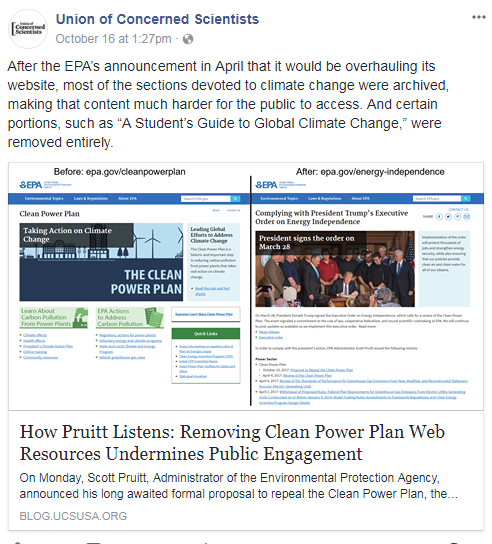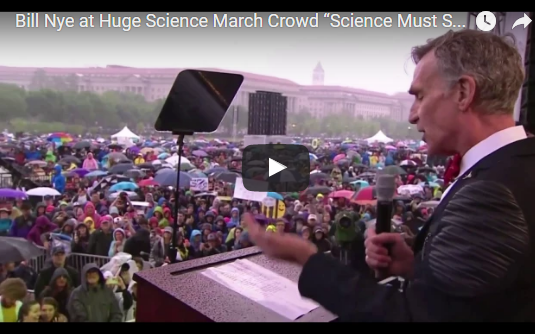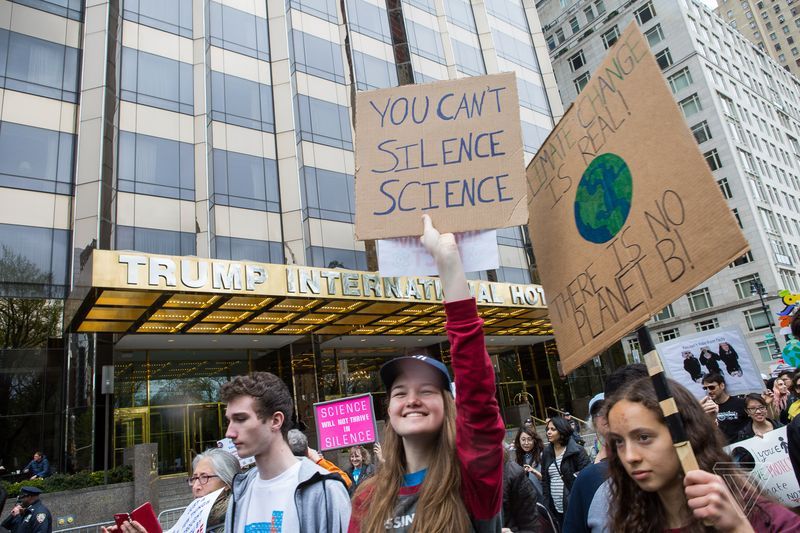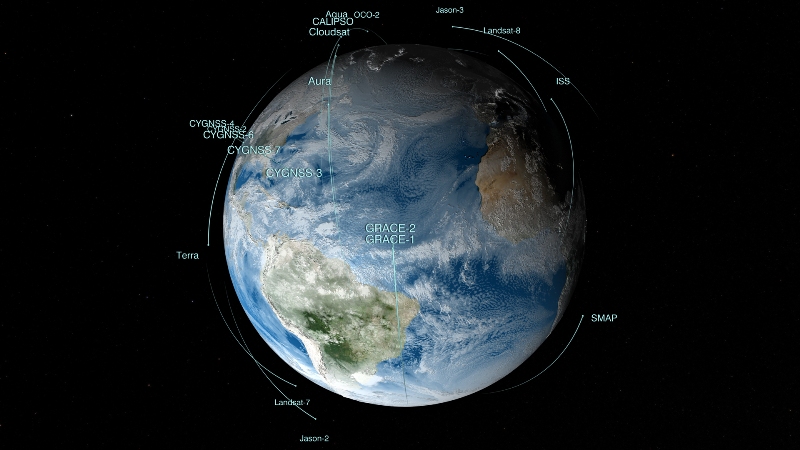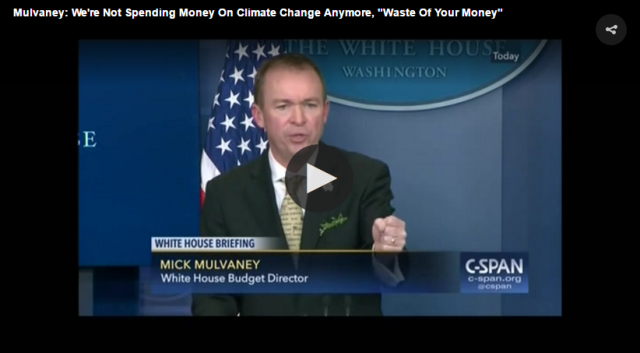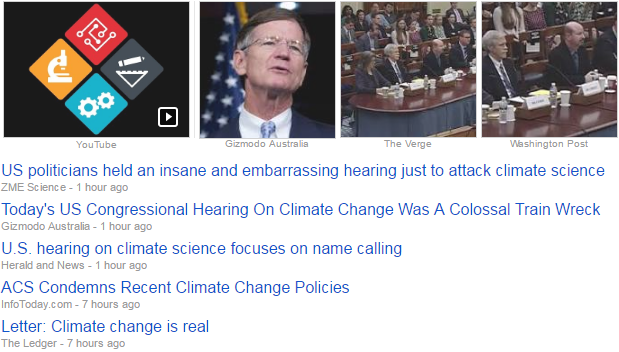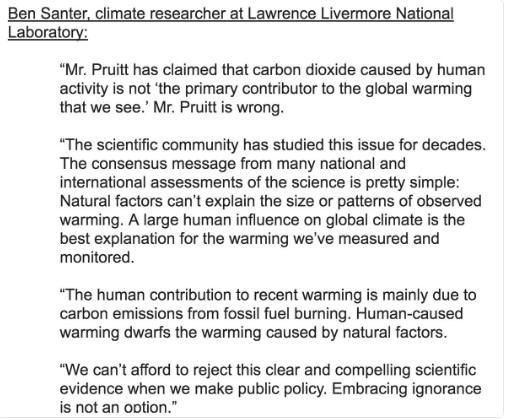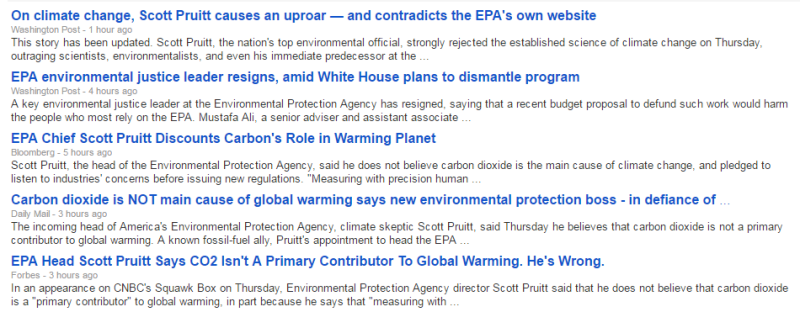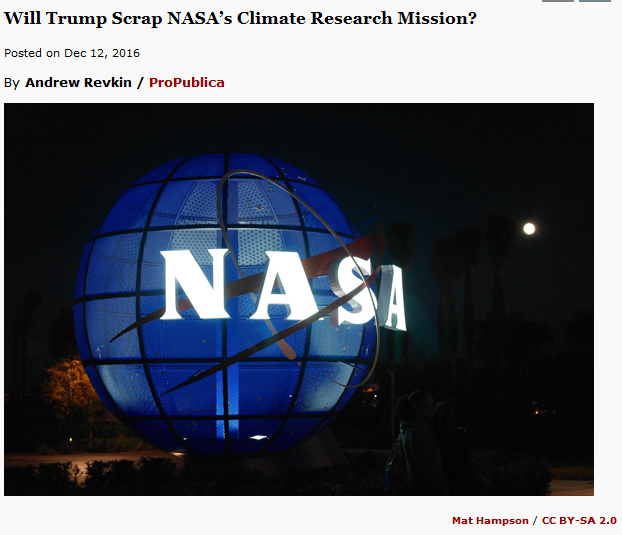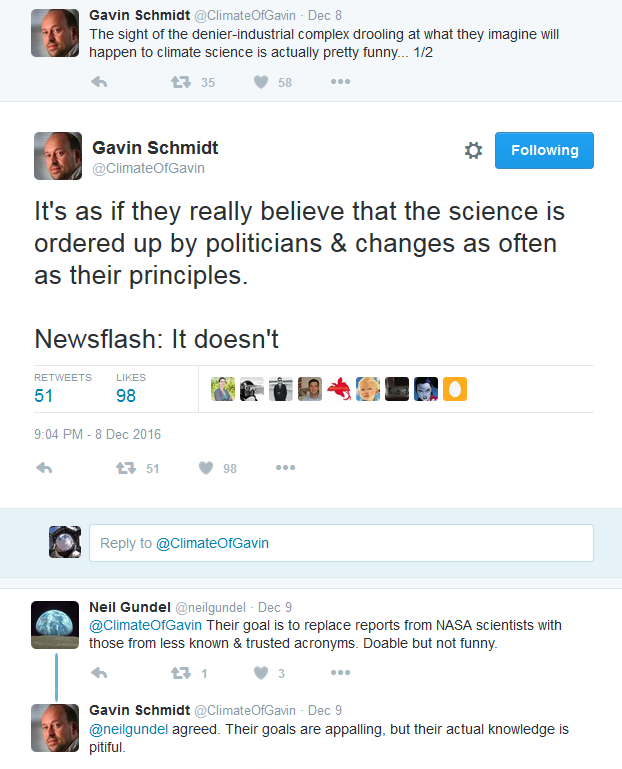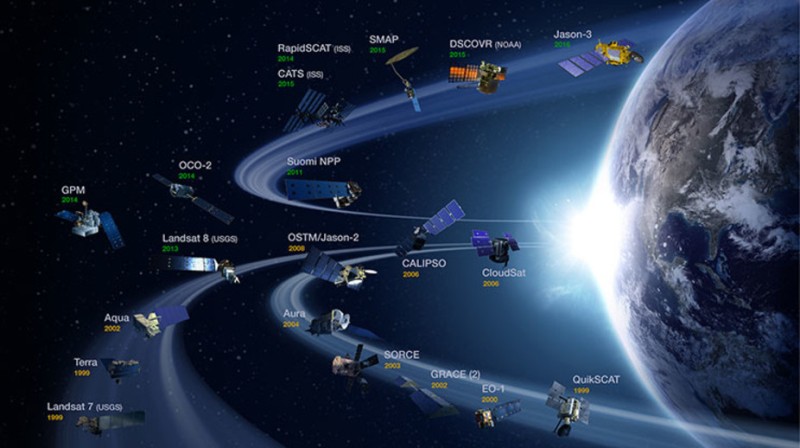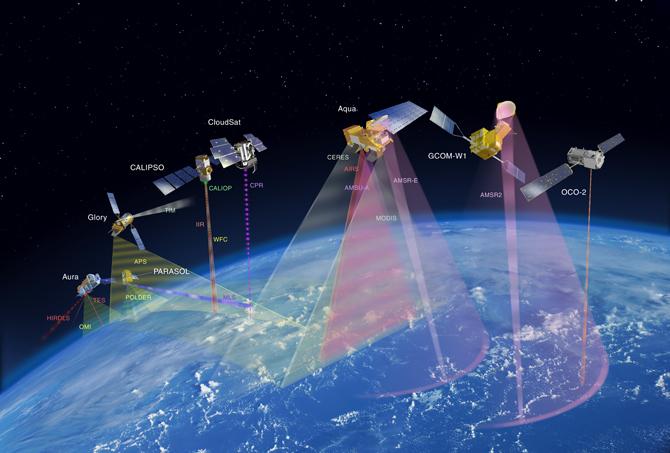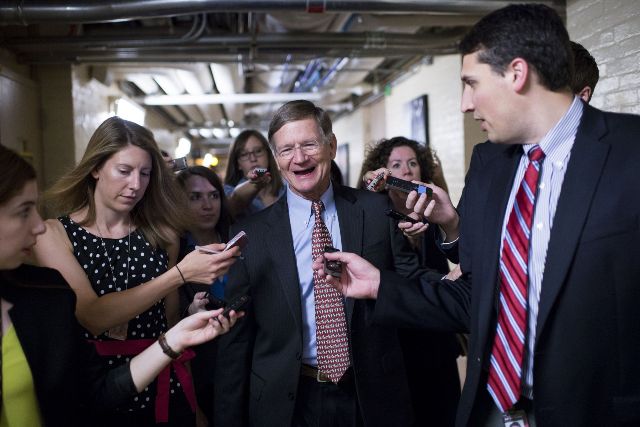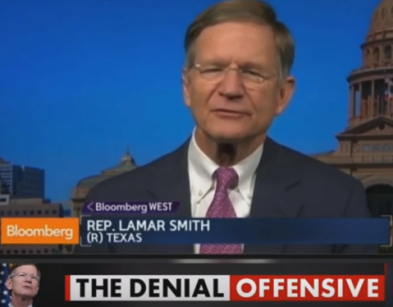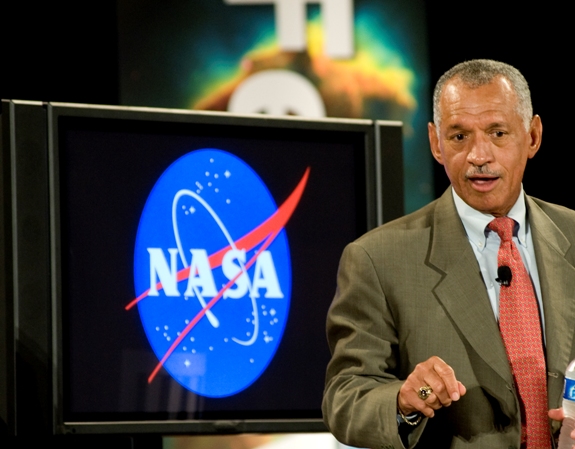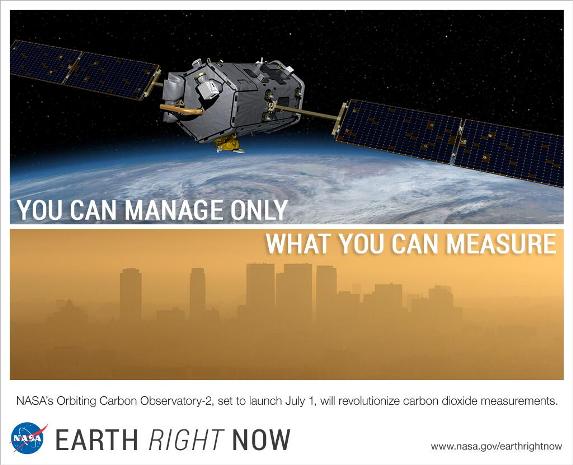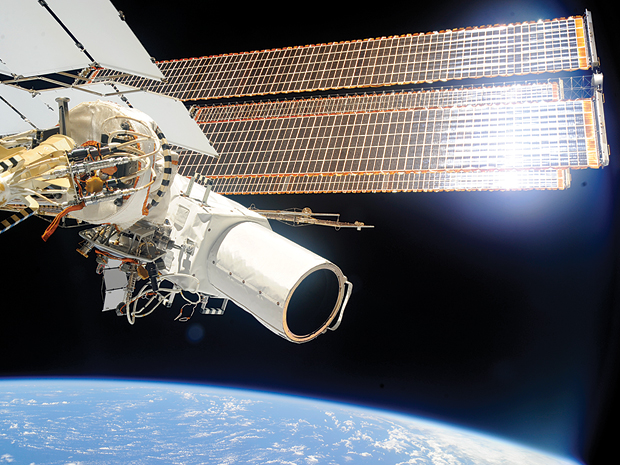Earth and Space, Politics
○ ○ ○ ○ ○ ○ ○ ○ ○ ○ ○
Visit Climate News
November 2017
- International Cooperation, Framework Convention on Climate Change
● Anti-Trump U.S. coalition tells U.N. climate talks: 'we're still in' / Reuters
The “we are still in” coalition of states, cities, universities, faith groups and environmental activists, aims to show delegates from other nations at the Nov. 6-17 U.N. talks that many Americans are working to cut greenhouse gas emissions.
It says its signatories represent more than 130 million Americans and $6.2 trillion of annual economic output.
● California Gov. Jerry Brown delivers a blunt climate change message in Germany
Brown has been hailed in German media as the “anti-Trump” for his efforts to keep the United States engaged in the 2015 Paris agreement’s commitments to cut greenhouse emissions...
“It’s hard to get your mind around something so extensive,” said Brown, who was appointed by Prime Minister Frank Bainimarama, the U.N. conference president, to serve as a special advisor for states and regions...
“Let’s lead the whole world to realize this is not your normal political challenge,” he added. “This is much bigger. This is life itself. It requires courage and imagination.”
○
October 2017
In the military, the term "beheading" generally refers to battlefield strategy of disrupting the eyes and ears of the enemy, the intelligence communication systems. Here the enemy is us, as the US president moves to disrupt the eyes and ears of NASA earth facing mission monitoring real-time conditions on the home planet. It would be, if the anti-sci caucus in Congress goes along and has their way, a historic mistake. The ability to manage is based on measurement over time and cutting off our overhead earth science research will produce blind spots today and "data gaps" going forward. Read the Sept Jon Gertner 'Going Dark' article to get an idea of what's at stake and some of the consequences of being beheaded.
What Could We Lose if a NASA Climate Mission Goes Dark?
File:Good science needs good data.png
- ○ ○ ○ ○ ○ ○ ○ ○ ○ ○ ○ ○ ○ ○ ○ ○ ○ ○ ○ ○ ○ ○ ○ ○ ○ ○ ○ ○ ○ ○ ○ ○ ○ ○ ○ ○ ○
- "Look at how thin our atmosphere is. This is all there is between humankind and deadly space."
- -- Astronaut Alexander Gerst @Astro_Alex
- "Thin Blue", Life-Enabling Atmosphere
- ○ ○ ○ ○ ○ ○ ○ ○ ○ ○ ○ ○ ○ ○ ○ ○ ○ ○ ○ ○ ○ ○ ○ ○ ○ ○ ○ ○ ○ ○ ○ ○ ○ ○ ○ ○ ○
Trump, Limbaugh, Scott and Pruitt deny climate change
America pays a 'denial price' today and tomorrow
It’s useless to explain to those who put political dogma before science that when air is warmer, it holds more water vapor. It’s that simple. The Economist notes that the world’s average temperature is about 1.2 degrees higher (Fahrenheit) than it was as recently as 1979. That’s a lot more water in the atmosphere — and it eventually it’s got to come down.
To such learned men like Limbaugh, who has a college degree from — well, from nowhere — that just means we get rain from time to time. After all, the weather changes every day, right? Brilliant!
But to others, who take such matters more intelligently, it means this: Weather-related disasters are increasing dramatically. Data from Munich RE, one of the world’s leading reinsurers, notes big spikes since 1980 in “meteorological events” (storms), “hydrological events” (floods, landslides and avalanches), and “climatological events” (extreme temperatures, droughts, forest fires). Munich’s data underscores what should be obvious to all but the most partisan skeptic: that the frequency, intensity and duration of “weather-related” events is on the rise.
This is the part where deniers mock “fake news” because it doesn’t jibe with their political beliefs. This is the highest form of ignorance: denying things that have already occurred.
Speaking of denial, one of the first things Florida Gov. Rick Scott did when he took office in 2011 was to ban official use of the words "climate change,” "global warming” and “sustainability.”
● Sea-Level Rise, Flooding in Florida
Such annoying phrases. Granted, Scott has done a good job in the days before and after Hurricane Irma. But we’ll never know how much less damage there might have been to businesses and homeowners had Scott chosen not censorship, but leadership six years ago by acknowledging climate change and facing it head on. Silence doesn’t make a problem like this go away.
Trump’s actions, meanwhile, have spoken louder than any words, banned or otherwise. He took more money from the coal industry — by far — than anyone else during the 2016 campaign. And as president, he has returned the favor in spades. He famously pulled out of the Paris climate pact — joining only war-ravaged Syria and tiny Nicaragua on the sidelines. He complained about all of Barack Obama’s executive orders, but signed one scrapping Obama’s Clean Power Plan rule designed to curb greenhouse gas emissions that contribute to global warming.
Trump has blamed Obama for coal’s decline, but the real reason is lower natural gas prices. Obama became president in 2009, yet between 2000 and 2010, power plants generated 50% more electricity from gas, while coal’s use declined slightly.
Obama gave these trends a further nudge, no doubt about it, but the shift from coal to cleaner, cheaper natural gas appears irreversible. I empathize with the coal industry, just as I would have empathized with the horse and buggy crowd in 1908, when Henry Ford’s first Model T spelled their demise. It’s called progress, folks.
And no column on energy and climate change would be complete without mentioning perhaps the worst Cabinet-rank pick ever made by an American president: Scott Pruitt. Pruitt, a climate denier par excellence, has, behind a cloak of secrecy and fear, turned the Environmental Protection Agency into an arm of the fossil fuel industry that has long had him in its pocket.
August 2017
Congress takes aim at the Clean Air Act
A push by Republicans to roll back parts of the Clean Air Act would affect California more than any other state...
The House last month passed a bill fiercely opposed by doctors and public health groups, including the American Lung Assn. and the American Academy of Pediatrics, that would delay for years new anti-pollution standards aimed at ultimately preventing 160,000 childhood asthma attacks and as many as 220 premature deaths in California each year.
The Trump administration had already tried using regulatory authority to put the standards on hold for a year, but walked back that action Wednesday after California and 14 other states filed suit against the delay.
● http://www.latimes.com/politics/la-na-pol-smog-republicans-20170803-story.html
● http://e360.yale.edu/digest/u-s-epa-reverses-decision-to-delay-smog-rule
SJS / Siterunner: I can literally remember LA movers and shakers pushing and drafting the first clean air legislation to deal w LA smog/air quality, then pushing the first national legislation, and pushing Nixon to sign on to the establishment of the EPA. The beginnings of the modern environmental movement, in many ways, signalled a children's health agenda ...
● https://www.greenpolicy360.net/w/Category:Air_Quality
● https://www.greenpolicy360.net/w/File:Env_policy_laws_US_%27the_beginning%27_of_env_era.jpg
● https://www.greenpolicy360.net/w/National_Environmental_Policy_Act -- https://www.greenpolicy360.net/w/File:Environmental_Protection_Agency_logo.png
● https://www.greenpolicy360.net/w/George_E._Brown_Jr -- https://www.greenpolicy360.net/w/Category:Environmental_Laws
○ ○ ○ ○ ○ ○
July 2017
GreenPolicy's snapshot of Greenland and NASA's IceBridge studies of melting glaciers -- https://www.greenpolicy360.net/w/Category:Greenland
● Lamar Smith Goes to Greenland
● Lamar Smith Returns from Greenland
Don't Believe Lamar's Line
WASHINGTON — Rep. Lamar Smith (R-Texas) — who has spent his career cozying up to fossil fuel interests, dismissing the threat of climate change and harassing federal climate scientists — is now arguing that pumping the atmosphere full of carbon dioxide is “beneficial” to global trade, crop production and the lushness of the planet.
Rather than buying into “hysteria,” Americans should be celebrating the plus sides of a changing climate, Smith argues in an op-ed published July 24th in The Daily Signal, a news website published by the conservative Heritage Foundation.
Smith — who has used his power as chairman of the House Committee on Science, Space and Technology to push his anti-science views — kicks off his op-ed by claiming Americans’ perception of the phenomenon is “too often determined by their hearing just one side of the story.”
“The benefits of a changing climate are often ignored and under-researched,” Smith said. “Our climate is too complex and the consequences of misguided policies too harsh to discount the positive effects of carbon enrichment.”
Increased carbon dioxide, Smith writes, promotes photosynthesis, resulting in a “greater volume of food production and better quality food” and “lush vegetation” that “assists in controlling water runoff, provides more habitats for many animal species, and even aids in climate stabilization, as more vegetation absorbs more carbon dioxide.” Warmer temperatures, he notes, results in longer growing seasons.
Smith goes as far as to make a case for why a rapidly melting Arctic, which scientists warn could cost tens of trillions of dollars by the end of this century, is a positive thing.
“Also, as the Earth warms, we are seeing beneficial changes to the earth’s geography,” he writes. “For instance, Arctic sea ice is decreasing. This development will create new commercial shipping lanes that provide faster, more convenient, and less costly routes between ports in Asia, Europe, and eastern North America. This will increase international trade and strengthen the world economy.”
○
Pruitt's & Trump's War on Science
Climate-change deniers go to great lengths to convince the public that there’s a legitimate scientific debate about whether humans are the main cause of global warming, but the Trump administration took this pathology to another level last week: Scott Pruitt, the head of the Environmental Protection Agency, plans to form a group to question the merits of climate science.
June 2017
The Future of Humanity, or Crime Against
- ○ ○ ○ ○ ○ ○ ○ ○ ○ ○ ○ ○ ○ ○ ○ ○ ○ ○ ○ ○ ○ ○ ○ ○ ○ ○ ○ ○ ○ ○ ○ ○ ○ ○ ○ ○ ○ ○ ○ ○ ○ ○ ○ ○ ○ ○ ○
"Clear-eyed outlook?" Not
- ○ ○ ○ ○ ○ ○ ○ ○ ○ ○ ○ ○ ○ ○ ○ ○ ○ ○ ○ ○ ○ ○ ○ ○ ○ ○ ○ ○ ○ ○ ○ ○ ○ ○ ○ ○ ○ ○ ○ ○ ○ ○ ○ ○ ○ ○ ○
The Consequences Start Now / June 1
● The US will be judged, this day will be long remembered.
● National Security & Global Security are interrelated. He doesn't know this. There's so much he doesn't know & so much he doesn't know that he doesn't know.
● Trump just betrayed the world. Now the world will fight back
● Brown: The Rest of the World Is Against Trump / Governor Brown Statement on White House Paris Climate Agreement Announcement
- “This current departure from reality in Washington will be very short-lived, that I promise you,” Brown told POLITICO in an interview. “I’ve spoken with Republicans here in the Legislature, and they’re beginning to get very serious about climate action, so the momentum is all the other way. And I think Trump, paradoxically, is giving climate denial such a bad name that he’s actually building the very movement that he is [purporting] to undermine...”
○ ○ ○ ○ ○ ○ ○ ○ ○ ○ ○ ○ ○ ○ ○ ○ ○ ○ ○ ○ ○ ○ ○ ○ ○ ○ ○ ○ ○ ○ ○ ○ ○ ○ ○ ○ ○ ○ ○ ○ ○ ○ ○ ○ ○ ○ ○
May 2017
Survey of Trump Attack on Environmental Regulations and Laws
Environmental Rules Rolled Back
April 2017
On Earth Day, as Around the World Planet Citizens "March for Science"
Bill Nye: "Our lawmakers must know and accept that science serves every one of us. Every citizen of every nation in society. Science must shape policy. Science is universal. Science brings out the best in us." Nye said. "With an informed, optimistic view of the future, we can — dare I say it — save the world!"
http://www.latimes.com/opinion/op-ed/la-oe-hayes-trump-budget-science-20170421-story.html
Trump's anti-science budget / America ought to own the solar-electric industry. By rights, we ought to be exporting solar technology, not importing it. Our second-tier status, in a field that we once absolutely dominated, is a direct consequence of budget decisions made by President Reagan’s Office of Management and Budget, and a go-along Congress.
Science has always been at the heart of America’s progress. Science cleaned up our air and water, conquered polio and invented jet airplanes. Science gave us the Internet, puts food on our tables and helps us avoid pandemics. Science and technology are widely considered by economists to be responsible for at least half of American economic growth since World War II.
Defunding science is the intellectual equivalent of eating our seed corn.
On Earth Day — April 22 — I expect millions of Americans to join the March for Science. They will include researchers, teachers, students and people who simply support good sense.
We will be marching because, if we let politics overtake the search for truth, much of what has made America great will disappear.
-- LA Times / April 21, 2017 / Dennis Hayes, a founder of Earth Day
○
Damaging the Collection of Data and Intelligence Necessary for National/Global Security
Earth Science Research from Space
● Former NOAA Chief Scientist Warns of Threats to Science
● Scientists Fear Climate Data Gap as Trump Aims at Satellites
● Dr. Gavin Schmidt, the director of NASA’s Goddard Institute for Space Studies, told the Independent he and other government scientists are “not going to stand” for any funding cuts or other interference in their work.
“The point is simple: the climate is changing and you can try to deny it, you can appoint people who don’t care about it into positions of power, but regardless nature has the last vote on this,” Schmidt, told The Independent Thursday. “It’s something we’re going to have to deal with sooner or later, and it’s better sooner rather than later. We don’t have a choice if we’re going to deal with it.”
18 NASA Earth Science Missions in Space
● EPA Chief, Scott Pruitt, Calls for ‘Exit’ from the Paris International Climate Accord
● More Fossil Fuels, Trump Demands of G7 Nations: They Go 'No'
● G7: US Is to Blame for No Joint Statement
March 2017
Mick Mulvaney, Trump’s budget director:
“Regarding the question as to climate change, I think the President was fairly straightforward—we’re not spending money on that anymore; we consider that to be a waste of your money to go out and do that.”
● Mulvaney: We're Not Spending Money On Climate Change Anymore, "Waste Of Your Money" (Video)
○
Lamar Smith Continues Push to Deny Climate Science
- House Science Committee Hearing Attacks Climate Change Evidence and Scientific Community
- Republican Party Denies Profound Risks, Threats, and Damage to National and Global Security
- Watch the March 29th Hearing -- https://www.facebook.com/TheHill/videos/10154707025269087/
- GreenPolicy's response -- Dr. Michael Mann tells the committee the facts of the gathering crisis... "dozens of independent lines of evidence come together... to arrive at the same, consistent answer, over and over again."
- More:
● http://gizmodo.com/todays-congressional-hearing-on-climate-change-was-a-co-1793787320
○
How climate skeptics are trying to influence 200,000 science teachers
Don’t Like The Science -- Make up Your Own Alternative Science
Climate Change Skeptic Group Seeks to Influence 200,000 Teachers
Koch-Funded Group Tries to Persuade 200,000 Science Teachers That Climate Change Is Debatable
○ ○ ○ ○ ○ ○ ○ ○ ○ ○ ○ ○ ○ ○ ○ ○ ○ ○ ○ ○ ○ ○ ○ ○ ○ ○
Undercutting National and Global Security:
- US Administration Moves to Eviscerate Earth Science
Lamar Smith Delivers Meaning to Hubris as 'Pride Goes Before a Fall'
Science Magazine / March 24 -- Representative Lamar Smith (R–TX) rarely expresses his true feelings in public. But speaking yesterday to a like-minded crowd of climate change doubters and skeptics, the chairman of the science committee in the U.S. House of Representatives acknowledged that the committee is now a tool to advance his political agenda rather than a forum to examine important issues facing the U.S. research community.
“Next week we’re going to have a hearing on our favorite subject of climate change and also on the scientific method, which has been repeatedly ignored by the so-called self-professed climate scientists,” Smith told the Heartland Institute’s 12th annual conference on climate change in Washington, D.C.
● About the Heartland Institute
● Heartland Meeting in Washington D.C.
Emboldened by the election of President Donald Trump, Smith appears increasingly comfortable dismissing those who disagree with his stance on any number of issues under the purview of his science committee, from climate research to the use of peer review in assessing research results and grant proposals. And one key element in his strategy appears to be relabeling common terms in hopes of shaping public dialogue.
“I applaud you for saying you’ll be using the term climate studies, not climate science,” said one audience member. His reference was to Smith’s embrace of a distinction made by a previous speaker, climatologist Patrick Michaels of the libertarian Cato Institute in Washington, D.C., who argues that most climate scientists don’t deserve to be called “scientists” because they have manipulated their data and ignored contrary results. “But I also urge you to use the term politically correct science.”
“Good point,” Smith replied.
Smith also signaled that he plans to turn up the volume on his criticism of federally funded research that doesn’t fit his definition of “sound science.” In particular, he expressed support for writing legislation that would punish scientific journals that publish research that doesn’t fit standards of peer review crafted by Smith and the committee (although he didn’t say how that would be accomplished).
More:
● https://thinkprogress.org/house-honest-act-limit-epa-science-244a132bdee
○
Step-by-Step: Damage to the Nation's Security
● Disappearing “Science” from the Core Mission Statement of the EPA Office of Science and Technology
The White House to eliminate NASA’s Office of Education, arguing that it was “performing functions that are duplicative of other parts of the agency.”
The budget targets the agency’s work on environmental science, cutting funding for Earth science research grants. It eliminates earth science missions that are still in development, including Plankton, Aerosol, Cloud, ocean Ecosystem, or PACE, which was was intended to monitor the Earth’s ocean health; the Orbiting Carbon Observatory 3, or OCO-3, an instrument to precisely monitor the carbon dioxide in our atmosphere; and the Climate Absolute Radiance and Refractivity Observatory, or CLARREO, pathfinder, which would have used a solar spectrometer to produce highly accurate climate projections.
On March 14th, Bloomberg reported that President Donald Trump is about to sign an executive order repealing President Barack Obama’s Clean Power Plan, and to order a reconsideration of the government’s use of the “social cost of carbon” metric, which measures potential economic damage related to climate change.
Last week, meanwhile, Trump’s Environmental Protection Agency administator, Scott Pruitt, suggested that carbon emissions have nothing to do with climate change.
This week, seventeen Republican members of Congress from diverse districts — including representatives from coastal Southeastern states, Nevada, Utah, upstate New York, and Pennsylvania — submitted a resolution in the House acknowledging that “human activities” have had an impact on the global climate and resolving to create and support “economically viable” mitigation efforts.
The resolution, sponsored by Reps. Carlos Curbelo of Florida, Elise Stefanik of New York, and Ryan Costello of Pennsylvania, is being submitted in the midst of an unprecedented effort by the most anti-science administration in recent American history to remove climate science studies and data from federal agencies.
● https://www.greenpolicy360.net/w/Category:Climate_Change
● https://www.greenpolicy360.net/w/Category:Climate_Policy
- ···········································································
Activists Rush to Save Government Science Data
● http://www.biologicaldiversity.org/news/press_releases/2017/publc-records-03-23-2017.php
Press Release / March 23, 2017
Scientists Use 'Beetlejuice Provision' to Protect Data From Trump
Records Requests Seek to Preserve Hundreds of Data Sets on Wildlife, Oil Industry, Climate Change, Sea-level Rise
The administration proposing deep budget cuts for government agencies including NASA Earth Sciences, the National Oceanic and Atmospheric Administration, and the Environmental Protection Agency have fueled new fears of databases being axed...
“We’ll probably be saying goodbye to much of the invaluable data housed at the NCEI,” Anne Jefferson, a water hydrology professor at Kent State University, wrote on Twitter Saturday, referring to the National Centers for Environmental Information. “Hope it gets rescued in time.”
It is illegal to destroy government data, but agencies can make it more difficult to find by revising websites and creating other barriers to the underlying information.
- The Environmental Data and Governance Initiative is an international network of academics and non-profits addressing potential threats to federal environmental and energy policy, and to the scientific research infrastructure built to investigate, inform, and enforce. Dismantling this infrastructure — which ranges from databases to satellites to models for climate, air, and water — could imperil the public’s right to know, the United States’ standing as a scientific leader, corporate accountability, and environmental protection.
○
- Via Scientific American / E&E News
Trump Administration Seeks Big Budget Cuts for Climate Research
- Targeting of climate science goes beyond the work of NOAA and EPA
The expected rollback to federal climate science has begun.
In its preliminary budget proposal, the Trump administration has targeted environmental protections and climate change research. And while the cuts are essentially an opening salvo in what promises to be a fight with Congress once the budget requests formally arrive, they also demonstrate the level of hostility many scientists feared their work would face from the White House.
The administration is seeking a nearly 20 percent cut to the National Oceanic and Atmospheric Administration's budget, including to its satellite division, The Washington Post reported. That includes significant cuts to the National Environmental Satellite, Data and Information Service, which has produced research that disproved the notion of a global warming pause. NOAA's satellites provide invaluable data on climate change that are used by researchers throughout the world. The NOAA cuts target the Office of Ocean and Atmospheric Research, which conducts the bulk of the agency's climate research.
That's on top of proposed reductions to climate research at U.S. EPA, including a 40 percent cut to the Office of Research and Development, which runs much of EPA's major research. The cuts specify work on climate change, air and water quality, and chemical safety. The Trump administration also has proposed 20 percent staffing reduction at EPA.
- Gina McCarthy, who headed the E.P.A. under former President Barack Obama, said she too saw Mr. Pruitt as unique. “It’s fine to have differing opinions on how to meet the mission of the agency. Many Republican administrators have had that,” she said. “But here, for the first time, I see someone who has no commitment to the mission of the agency.”
- Environmental Protection Agency Administrator Scott Pruitt said Thursday (March 8th in a CNBC interview) he does not believe carbon dioxide is a primary contributor to global warming.
- "I think that measuring with precision human activity on the climate is something very challenging to do and there's tremendous disagreement about the degree of impact, so no, I would not agree that it's a primary contributor to the global warming that we see."
○
Clean Air, Clean Water? Healthy Environment? Climate, Sustainable Future?
- Environmental Issues and the Warnings of Science Are 'No Priority'
http://www.popsci.com/getting-rid-of-the-environmental-protection-agency
http://www.popsci.com/pruitt-EPA-confirmation
http://www.popsci.com/usda-epa-science-gag-order-government
http://www.popsci.com/america-before-epa-photos
February 2017
Congress committee lost in space -- https://eos.org/articles/focus-nasa-on-mars-and-moon-not-earth-witnesses-tell-hearing
January 2017
- Climate News -- https://www.greenpolicy360.net/w/Climate_News
Science & Politics in the US Congress: Another Year, More Science Denial on the House Science Committee
- Via E&E News and the Smithsonian Online
- House Science Panel Adds Climate-Denying Members
The Science committee has jurisdiction over $40 billion in federal budgets, and influence on climate research and environmental regulations
December 2016
- The U.S. House Committee on Science, Space and Technology continues its move away from acting to ensure national security
- The story - and gathering danger of ignoring scientific warnings - is expanded here by long-time environmental writer Andy Revkin
NASA’s Climate Research, Essential to National & Global Security
Dec 12, 2016
Via Andrew Revkin (in his new, post Dot Earth/NYT 'beat' at ProPublica)
https://www.propublica.org/article/will-trump-scrap-nasas-climate-research-mission
Piers J. Sellers is the director of NASA’s Earth Science division, and the former astronaut is a climate scientist himself. ProPublica spoke with him recently. Sellers declined to discuss the politics surrounding NASA during a presidential transition, but said the agency has a unique position in the world in clarifying global environmental risks and that part of its mission deserves support.
“We’re doing our best to provide the least dangerous options to getting from here to a safe future,” he said. “That’s our job as U.S. government scientists. NASA has the greatest capability to see what’s going on and has a pretty strong capability to model what’s going on into the future, as well.”
Some of NASA’s most vital Earth science work has been done at a tiny climate research hub, the Goddard Institute for Space Studies. The center occupies the upper floors of a century-old building in upper Manhattan best known for Tom’s Restaurant, the cash-only corner diner famed because its façade was featured in the sitcom “Seinfeld.”
The institute was led for decades by James E. Hansen, the climate scientist who stepped ahead of most peers in the hot summer of 1988, famously telling a Senate panel it was “99 percent certain” that human-generated greenhouse gases were driving global warming. A decade ago, Hansen defied muzzling efforts during the George W. Bush administration and irked defenders of fossil fuels with his warnings of calamitous warming. He retired in 2013 to focus on activism aimed at curbing emissions of greenhouse gases linked to warming.
The institute has produced one of the four most important records of global temperature trends and, under Hansen’s successor as director, the TED-talking, Twitter-savvy climatologist Gavin A. Schmidt, has continued to refine climate simulations and communicate warnings about unabated warming.
Schmidt declined to be interviewed for this story, citing what he described as selective quoting in recent coverage of possible threats to Earth science under the Trump administration. But he’s shown no signs of dread in his personal Twitter flow, on Thursday night posting this provocative two-parter:
○ ○ ○ ○ ○ ○ ○ ○ ○ ○ ○ ○ ○ ○ ○ ○ ○ ○ ○ ○ ○ ○ ○ ○ ○ ○ ○ ○ ○
Read More on Vital Security Interests & Earth Science:
- NASA critics have long wanted to shut the agency out of research related to climate change. The problem is, not only is earth science a long-running part of NASA’s “prime mission,” but it is uniquely positioned to do it. Without NASA, climate research worldwide would be hobbled.
- NASA’s role in earth science began at its inception: The Space Act of 1958, which created NASA, made the study of our atmosphere one of its top priorities. During the Reagan years, Congress amended the act to make Earth the first of NASA’s nine fundamental missions. Right now there are at least 15 earth-science satellites that NASA helped build, launch and operate; they monitor everything from global rainfall to soil moisture.
- ○
- Via Dot Earth/NYT: Under Trump, Will NASA’s Space Science Include Planet Earth? / After Nine Years and 2,810 Posts, a Dot Earth Farewell
- By Andrew C. Revkin, December 5, 2016
○ ○ ○ ○ ○ ○ ○ ○ ○ ○ ○
November 2016
Trump to scrap Nasa climate research in crackdown on ‘politicized science’
NASA’s Earth Science division is set to be stripped of funding... Via The Guardian
GreenPolicy: It is painful to acknowledge how slight the attention has been by the US media toward what is, demonstrably, one of the greatest threats rising in the US Congress.
In the above-linked 'Trump to scrap climate research' article, the UK Guardian looks toward the next US administration and points to warning flags that should be raised -- but have not, while the daily-cycle news and mainstream media focuses elsewhere.
We/GreenPolicy360 have been warning about a close-and-present threat in the House science committee and now the danger of profoundly flawed decision-making draws closer as Lamar Smith and a science denial caucus looks to continue, with added powers, their efforts to eviscerate the US Earth Science budget and missions.
The threatened actions of the House Science Committee, in fact, are looming as a serious threat to 'homeland security'. The actions of this science denial group promise to undercuts national/global security.
Take a closer look at what GreenPolicy360 has been reporting taking place in the people's Congress. It is time to draw attention to the risks -- and consequences -- of a Congress rejecting science.
Of course in the legislative process, one has to accept consensus science and the scientific method and policy based on best evidence available and the 'precautionary principle'.
Or, as in the case of the insurance industry, factor in actuarial risks, odds, and a full-cost accounting.
We will soon find out what actions -- and what legacy -- the American people at the beginning of the 21st century pass forward for future generations.
The U.S. and this Congress will be judged based on its actions.
○
Consider the Existing Earth Science Missions
- The data and Earth observation/monitoring are the resources our generation is passing forward to future generations
- The goal is to provide the capabilities to make informed decisions and shape intelligent policies to protect and preserve security
○ ○ ○ ○ ○ ○ ○ ○ ○ ○ ○ ○ ○ ○ ○ ○ ○ ○ ○ ○ ○ ○ ○ ○ ○ ○ ○ ○ ○ ○ ○ ○ ○ ○ ○ ○ ○ ○ ○ ○
NASA: Earth is warming at a pace 'unprecedented in 1,000 years'
The planet is warming at a pace not experienced within the past 1,000 years, at least, making it “very unlikely” that the world will stay within a crucial temperature limit agreed by nations just last year, according to Nasa’s top climate scientist.
“In the last 30 years we’ve really moved into exceptional territory,” Gavin Schmidt, director of Nasa’s Goddard Institute for Space Studies, said. “It’s unprecedented in 1,000 years. There’s no period that has the trend seen in the 20th century in terms of the inclination (of temperatures).”
This year has already seen scorching heat around the world, with the average global temperature peaking at 1.38C above levels experienced in the 19th century, perilously close to the 1.5C limit agreed in the landmark Paris climate accord. July was the warmest month since modern record keeping began in 1880, with each month since October 2015 setting a new high mark for heat.
○
“Maintaining temperatures below a 1.5C guardrail requires significant and very rapid cuts in carbon dioxide emissions or co-ordinated geo-engineering.
That is very unlikely. We are not even yet making emissions cuts commensurate with keeping warming below 2C.”
○
Space, Earth Science & Climate Change
I used to be an astronaut, a spacewalker on the International Space Station... The Station goes around the world in an hour and a half, which means it flies through fifty minutes of day, followed by fifty minutes of night, endlessly repeating. This means that during a seven-hour spacewalk, you may see four sunrises and sunsets. I remember holding onto a handrail on the outside of the Station, which was flying silently up the Atlantic, from south to north, and as we moved toward Europe I could see the terminator—the line between night and day—rolling up over the horizon ahead of us. The white sun sank quickly behind us in a showy flurry of orange, pink, and red horizon bands, and then we were suddenly in twilight, floating into the dark half of the world. The terminator flicked over us, and, in the deeper darkness ahead and below us, I could see a huge lit-up city, glued to the curved Earth, sliding up over the rim of the world to meet me. I could see the structure of the city, with its glowing heart, its network of roads and its halo of suburban lights fading into the dark countryside...
The facts of climate change are straightforward: there’s been a warming surge over the past hundred years, with a dramatic uptick in this new century. We are seeing the effects in the shrinking of the summer Arctic sea ice and the melting of the Greenland glaciers. That melt, in turn, has been partly responsible for the three-inch rise in sea levels since 1992. The Earth is warming, the ice is melting, and sea level is rising. These are observed facts.
Are we humans the cause of these changes? The answer is an emphatic yes. Many climate-research groups around the world have calculated the various contributions to climate change, including those not related to humans, like volcanic ash. It has been shown repeatedly that it is just not possible to explain the recent warming without factoring in the rise in anthropogenic greenhouse gases.
As a scientist, I would like to think that the political discussion of climate change and how to mitigate its worst effects would be sober and fact-based. Unfortunately, this is not the case. Climate-change deniers in the United States have done a first-class job in spreading confusion and misinformation. As a result, many prominent politicians insist, and get away with insisting, that climate change is a hoax, a mantra that has gained some credibility through sheer repetition. Climate deniers are also fond of saying that global warming is not resolved in science or is “just” a theory. This is a perfect example of Orwellian Newspeak which also flies in the face of three hundred years of scientific progress, in which intellectual argument and conviction must be based on facts and substantiated theories, rather than personal beliefs or biases.
It is also dangerous.
○
Coalition of 25 states, cities and counties / AGs United for Clean Power
Unprecedented Coalition - Attorneys General From California, Connecticut, District Of Columbia, Illinois, Iowa, Maine, Maryland, Massachusetts, Minnesota, New Mexico, New York, Oregon, Rhode Island, Virginia, Vermont, Washington State And The US Virgin Islands Agree To Coordinate Efforts
Schneiderman: Climate Change Is The Most Consequential Issue Of Our Time. This Unprecedented State-To-State Coordination Will Use All The Tools At Our Disposal To Fight For Climate Progress
Attorneys general go after ExxonMobile
Attorneys general from 13 states and more than a dozen members of the House Science Committee enter the fray on ExxonMobil's behalf
- http://www.commondreams.org/views/2016/07/06/exxonmobil-may-have-friends-high-places-fraud-not-constitutionally-protected
- http://billmoyers.com/story/exxonmobil-may-friends-high-places-fraud-not-constitutionally-protected/
- http://www.courthousenews.com/2016/09/09/texas-backs-exxonmobil-in-climate-fight.htm
More:
US House Committee on Science Update: Lamar Smith Continues on his Merry Way
- Scientific Organizations Step Up to Block the Chairman's Politics
Letter from President of Union of Concerned Scientists to Lamar Smith, Chair of House Science Com't
Open Letter From Legal Scholars on the (California) Climate Science Truth and Accountability Act
May 19, 2016
We, the undersigned legal scholars, are writing to comment on Senate Bill 1161 (Allen), the Climate Science Truth and Accountability Act. As experts in constitutional law, environmental law, corporate law, and securities law, we believe that SB 1161 furthers the protection of consumers from unfair business practices with respect to scientific evidence regarding anthropogenic climate change.
'A growing body of evidence indicates that major fossil fuel companies knew the risks and potentially catastrophic consequences of processing and burning their products for decades, and as early as the 1950s. This evidence suggests that certain commercial representations made in the intervening decades by major fossil fuel companies regarding the scientific link between fossil fuels and climate change would constitute a deceptive, misleading, or fraudulent business practice...
○
U.S. Presidential Campaign: Environmental Threats
What Problems, We See No Problems
Trump v the World: Announces his Energy policy
- May 25 / The Republican presidential candidate's position -- Cancel the Paris agreement, More fossil fuels, Less Clean/Renewable Energy
Trump declares he doesn't believe the science and believes climate change a hoax
- Environmental Scorecard: Cruz drops out of race. During Texas Senator's term in office, he voted against every green bill,
- and opposed every pro-environment, anti-pollution piece of legislation
○ ○ ○ ○ ○ ○ ○ ○ ○ ○
Does Republican candidate Trump really believe this or not?
○ ○ ○ ○ ○ ○ ○ ○
Reviewing 2015
- Environmental Security, Risks
NASA Earth Sciences 2016 Budget No Longer to be Cut $500 Million
The final budget bill provides $1.92 billion for Earth Science research, just $20 million less than the President's original budget request. The cut is slight compared to initial GOP budget cuts proposed in the House and Senate which had slashed as much as $500 million from the President's request.
NASA administrator Charles Bolden argued before Congress this summer and fall that it was critical to increase the size of NASA's Earth Science programs.
Under the newly passed Fiscal Year 2016 NASA Budget, virtually all of the agency’s programs benefit with either full or added funding. This national security priority will be jeopardized under Republican revanchist policy. The security, Earth Science work of NASA/NOAA is perceived not as advancing security, but as a threat to business. The security debate heats up and those who consider the science and data continue to step forward looking to changes in how we must perceive national - and global - security. -- http://www.universetoday.com/123937/nasa-receives-significant-budget-boost-fiscal-year-2016/
○ ○ ○ ○ ○ ○ ○ ○ ○ ○ ○ ○ ○ ○ ○ ○ ○ ○ ○ ○ ○ ○ ○ ○ ○ ○ ○ ○ ○ ○
Via the New Republic, Dec 15
What Climate Agreement? GOP Candidates Ignore the International Agreement
Via Strategic Demands, Dec 13
Historic global accord to move toward renewable energy
○ ○ ○ ○ ○ ○ ○ ○ ○ ○ ○ ○ ○ ○ ○ ○ ○ ○ ○ ○ ○ ○ ○ ○ ○ ○ ○ ○ ○ ○
Democrat presidential candidate debate, November 14, 2015 (LA Times) -- Sanders was asked whether he still believed, as he had earlier stated, that global warming was the greatest threat to national security. “Absolutely,” Sanders replied, suggesting that “climate change is directly related to the growth of terrorism”, with the fight over natural resources like water possibly leading to even greater international conflict.
Syria May Be the First Climate-Change Conflict but It Won't Be the Last by Joshua Holland, The Nation, Oct 27, 2015 --- Look at Syria more closely...
It was what one expert called perhaps “the worst long-term drought and most severe set of crop failures since agricultural civilizations began in the Fertile Crescent.” It destroyed the livelihoods of 800,000 people and sent vastly more into poverty. The poor and displaced fled to cities, “where poverty, government mismanagement and other factors created unrest that exploded in spring 2011,” the study’s news release explains.
Syria: Climate Change, Drought and Social Unrest
Water crisis in the MidEast [1] [2] [3] [4] [5]
○ ○ ○ ○ ○ ○ ○ ○ ○ ○ ○ ○ ○ ○ ○ ○ ○ ○ ○ ○ ○ ○ ○ ○ ○ ○
Years of Living Dangerously - Syria
- Years of Living Dangerously, presented on National Geo channel, Solutions to Climate Change
- What We Can Do
○ ○ ○ ○ ○ ○ ○ ○ ○ ○ ○ ○
A Climate deal in Paris, a Move toward Peace / via the New Yorker
○ ○ ○ ○ ○ ○ ○ ○ ○ ○ ○ ○ ○ ○
- Syrian Civil War: Prince Charles: Environment 'significant' factor in Syrian war
- Climate Change and the Syrian Civil War (ECC Factbook Conflict Analysis) / Nov 2015
○ ○ ○ ○ ○ ○ ○ ○ ○ ○ ○ ○
(Sanders as quoted in 'Politico') -- "The scientific community is telling us if we do not address the global crisis of climate change, transform our energy system away from fossil fuel to sustainable energy, the planet that we're going to be leaving our kids and our grandchildren may well not be habitable." -- Bernie Sanders, Oct 2015
Climate Change Still Greatest Threat to Security
In 2014, the Defense Department released its “Climate Change Adaptation Roadmap,” describing the issue not as a long-term concern, but something that “poses immediate risks to U.S. national security.”
○ ○ ○ ○ ○ ○ ○ ○ ○ ○ ○ ○ ○
U.S. Congress Science Committee Disputes Climate Science
Lamar Talks of Conspiracy: Dems Fire Back
Republicans Seek to Strangle Paris Climate Pact -- via Politico / Nov 23
Committee Threatens Subpoenas -- via Washington Post / Nov 18
○
Lamar Smith, Science Committee Chair Escalates Attack on Scientific Studies / Oct 23, 2015
The congressional committee on science issues subpoenas to the Obama administration over a recent scientific study refuting claims that global warming had “paused” or slowed over the last decade...
○ ○ ○ ○ ○ ○ ○ ○ ○ ○ ○ ○ ○ ○ ○ ○
○
NOAA refuses to turn over scientists’ emails....
Showdown looms with climate change deniers / Oct 28
○ ○ ○ ○ ○ ○ ○ ○ ○ ○ ○ ○ ○ ○ ○ ○ ○ ○ ○ ○ ○ ○ ○ ○ ○ ○ ○ ○ ○ ○ ○ ○
- Earth Science Faces Deep Cuts
Undercutting Security, Congress Moves to Eviscerate NASA/NOAA Earth Science Programs
House budget authorization mark-up slashes $500 million from NASA’s Earth science programs
Potentially a ray of promise in the U.S. Senate on one front in the ongoing debate between an anti-science faction and those urging more science effort be directed at climate change issues and data needed for effective policy -- “The Committee encourages the Secretary to increase funding for academia to perform climate model studies that include the collection and evaluation of atmospheric data sets from satellite observations obtained in cooperation with NASA. Satellite observations of the atmosphere, within the context of the Earth as a global system, provide information that is critical in the interpretation of Earth-based observations. In addition, the Committee encourages the Secretary to allocate 5 percent of the Department’s funds spent on climate change models, studies, or evaluations to create a Red Team, so as to ensure science-based findings.” 114TH Congress Report -- SENATE 1st Session 114–54 to accompany H.R. 2028
From GreenPolicy360: A Congressional faction looking to hobble Earth-Science-research-from-space presents a larger challenge. Climate-change denialists and anti-science partisans do not want to face the data from a new fleet of NASA Earth monitoring satellites. The security threat environment, by most all credible sci, is accelerating fast, yet extreme political voices want to cover the eyes of this generation's reporting of NASA earth observation programs "Earth's Vital Signs". The scientific data tracking Earth systems is long overdue, is essential, and should be continued and expanded not radically cut...
Earth Science 'Outrages' Congressional Republicans / October 2015 via Ars Technica
House Science Committee Guts Earth Sciences Budget / May 2015 via Ars Technica
-=-=-=-=-=-=-=-=-=-=-=-=-=-=-=-=-=-=-=-=-=-=-=-=-=-=-=-=-=-=-=-=-=-=-=-=-=-=-=-=-=-=-=-=-=-=-
What's at risk in Earth Sciences
GreenPolicy360: The current debate in the United States Congress is highlighted by voices who would set aside the consensus of the scientific community and cut back budgets for Earth Science studies from space. The recent launches of a fleet of new NASA satellites and related missions to acquire critical data of Earth systems is now threatened by politicians who profess they are "not scientists" and, as a result, cannot speak to the validity of human-caused impacts and threats to natural systems. The vantage point of space offers a unique platform for risk assessment, studying and monitoring Earth's systems over time and, hopefully, better managing the well-being and sustainability of critical systems. Those who undercut the environmental and national security of these missions should be questioned and challenged.
GreenPolicy360 will continue to track the positions and responses of politicians in countries around the globe with an emphasis on those with existing earth-space programs.
The extreme point of view of a US Senator from Texas and anti-science perspective a newly elected Congress are coming to the fore and threaten to have more impact on the nation's security. Senator Cruz from Texas questions and doubts the need for scientific studies that are confronting a host of challenges to the planet's environmental security and, as a result, the US security. Rather Senator Cruz from Texas brings evangelical zeal and religious beliefs that sharply criticize the science of NASA and its recent Earth-monitoring satellite programs.
Projects Supported / Past-Present
Atmospheric Science Data Center
-=-=-=-=-=-=-=-=-=-=-=-=-
Cruz versus Bolden
March 12, 2015
Texas Senator Ted Cruz: "More Space, Less Earth"
Ted Cruz Tells NASA to Stop Worrying About Climate Change and Focus on Space
The Texas Republican and likely presidential candidate told NASA’s chief administrator, Charles Bolden, on Thursday to focus on “what inspires little boys and little girls across this country.”
Ted Cruz and Charles Bolden would probably agree that the core of the Earth is a mass of molten metal as hot as the sun. But as for the core of NASA's mission, the senator from Texas and the former astronaut split ways.
Since taking the chairmanship of the Senate Space, Science, and Competitiveness Subcommittee this year, Cruz has been pushing the agency to adopt a "more space, less Earth" strategy. The Republican lawmaker argues that the Obama administration is wrongfully neglecting the country's space exploration operations—like potential missions to Mars and beyond—in favor of global-warming research. And he wants to know if Bolden, NASA's administrator, thinks so, too.
"I'd like to start by asking a general question," said Cruz on Thursday during a subcommittee hearing on the president's $18.5 billion budget request for NASA for fiscal 2016, which allocates considerable funding for Earth- and ocean-science projects. "In your judgment, what is the core mission of NASA?"
Bolden said he'd been contemplating that mission over the past few days, and had read over the National Aeronautics and Space Act of 1958, which created the agency. "Our core mission from the very beginning has been to investigate, explore space and the Earth environment, and to help us make this place a better place," he said, adding that the study of aeronautics is important as well.
Cruz didn't seem pleased with the "Earth environment" part of Bolden's answer. "Almost any American would agree that the core function of NASA is to explore space," he said. "That's what inspires little boys and little girls across this country ... and you know that I am concerned that NASA in the current environment has lost its full focus on that core mission."
Cruz then pointed to a chart behind him titled "Focus Inward or Focus Outward? Refocusing NASA's Core Priorities" that compared NASA's budget in 2009 with the current request. He said that since 2009, funding for Earth sciences has seen a 41 percent increase, while funding for exploration and space operations, what Cruz "would consider the core function of NASA," has seen a 7.6 percent decrease.
"In my judgment, this does not represent a fair or appropriate allocation of resources, that it is shifting resources away from the core functions of NASA to other functions," Cruz said. "Do you share that assessment?"
Bolden, who decides how to allocate NASA's annual budget, did not. That dip in space exploration funding? That was kind of the whole point. "Mr. Chairman, I am very interested in your chart," he said. "I will say one thing—it is interesting to note that there is a decrease in exploration and human spaceflight when, in fact, that was somewhat intentional because we were trying to get the cost of exploration down as we reach farther out into the solar system."
Bolden said the now-defunct space shuttles cost NASA $2 billion a year to maintain whether they flew or not. Today, NASA has a $6.6 billion contract with private companies Boeing and SpaceX that will provide for 16 human spaceflights over a span of three to four years.
"So I think the decrease is actually a little bit of what we're trying to do to get the cost of flying humans into space down," he told Cruz. "That's what's driving the market, is reducing launch costs."
More money for Earth-science research is a good thing, he continued. "The fact that Earth-science has increased—I'm proud to say that it has enabled us to understand our planet far better than we ever did before," Bolden said.
The NASA chief distanced himself from Cruz's assessment of spending changes within the agency.
You asked me about your chart. There's a lot of chartsmanship," Bolden said, chuckling. "I'm not sure what you include in 'exploration,' for example. So, by my statement, I was not acknowledging that I agree with the numbers on the chart. I don't want everyone to say I accept the numbers on the chart."
The exchange offered a glimpse of NASA under a potential Cruz presidency. Climate-change researchers let out an audible groan when Cruz, who is expected to run in 2016, took the helm of the Senate subcommittee overseeing the federal agency in January. Cruz's views—especially his belief that global warming doesn't exist—are at odds with NASA's extensive climate-science programs, which study solar activity, sea level rise, and oceanic temperatures, to name a few. On Thursday, Bolden appeared to hope the senator's opinions wouldn't get in the way of how NASA spends its money.
"We can't go anywhere if the Kennedy Space Center goes underwater and we don't know it—and that's understanding our environment," Bolden said, alluding to the risk that climate change poses to the low-elevation state of Florida. "It is absolutely critical that we understand Earth environment because this is the only place that we have to live."
-=-=-=-=-=-=-=-=-=-=-=-=-=-=-=-=-=-=-=-=-
One Senator's priorities:
The Cruz mission: More Space, Less Earth
... In Cruz's mind, President Obama has spent too much of the agency's resources studying the planet we already inhabit, rather than focusing its missions on the "infinity and beyond" objectives that have the potential to captivate Americans.
For Cruz to rewrite NASA's objectives, he'd need the approval of his subcommittee, votes in the full Senate and House, and Obama's signature. Even for someone used to fighting long legislative odds, it's likely Cruz's role will be less about principled showdowns over must-pass legislation and more about shining a spotlight on perceived priorities.
Last year, NASA launched five new missions to study Earth's climate, and Earth science missions currently occupy about 10 percent of NASA's budget. Cruz believes that has come at the expense of "the core mission of NASA, manned space exploration."
"There are tremendous opportunities for commercial space," Cruz says. "One of the very first focuses of the subcommittee will be on expanding those opportunities, expanding how we can allow the private sector to create jobs, to create growth, and how we can explore new frontiers in space."
Those in the commercial space industry believe Cruz recognizes their potential. "We're seeing a well-diversified commercial renaissance in Texas. That's something that philosophically the senator feels good about," said NanoRacks co-founder Jeffrey Manber. His company contracts with NASA to provide computer-lab space and small satellite launches from ISS.
-=-=-=-=-=-=-=-=-=-=-=-=-=-=-=-=-=-=-=-=-
GreenPolicy360: Of course, the data demonstrates that much of NASA's work based in Texas, as the Texas Senator is aware, brings benefits to Texas, economic benefits and incalculable benefits beyond the state of Texas -- NASA has led the world's scientific efforts to study space and Earth's unique life-giving systems in space.
The field of "New Space", extending beyond first-generation space/earth science and continuing NASA missions with economies, is building a fast-growing vital industry in cooperation with NASA. New Space extends the mission of the US space program as multiple start-up companies supply NASA missions and launch micro-satellites and remote sensing services and Internet distributed products and information across a wide spectrum of business, natural resources, science and critical environmental fields. Over the past several years, the venture capital market has hurried to support these start-ups, as the international business potential has become evident. One company as an example of many NASA-space, earth-science related companies in Texas is NanoRacks, deploying next-gen satellites from the ISS. The Texas "New Space" NASA-related business focus on deploying earth-facing, earth-science satellites is poised to become a worldwide industry.
Visionary space-based, earth-science NASA missions involves billions of dollars in commercial space work grouped around NASA -- the work is essential to diverse, forward-looking Earth Science and 'smart' management of the planet as humankind takes responsibility for the by-products of industrial production and 'externalities'.
-=-=-=-=-=-=-=-=-=-=-=-=-=-=-=-=-=-=-
March 12/13/14, 2015
“Virtually all academic planetary scientists are in earth science departments, because the Earth, after all, is a planet,” says Margaret Leinen, president of the American Geophysical Union (AGU) and a former head of the National Science Foundation’s geosciences directorate. “Of course the geosciences are part of the hard sciences,” explains Leinen, head of the Scripps Institution of Oceanography and vice chancellor for marine sciences at the University of California, San Diego. “They provide us with very fundamental knowledge about the way the planet works, knowledge grounded in the physical sciences.”
http://mashable.com/2015/03/12/ted-cruz-nasa-earth-science-attack/
http://sciencepolicy.agu.org/files/2013/07/AGU-letter-to-Sen-Cruz-March-2015.pdf
http://thinkprogress.org/climate/2015/03/13/3633354/ted-cruz-nasa-mission/
http://stgist.com/2015/03/gop-sen-ted-cruz-nasa-funding-climate-change-topic-1840
http://www.ibtimes.com/ted-cruz-wants-nasa-focus-deep-space-missions-instead-studying-earth-1847112
http://www.bloomberg.com/politics/articles/2015-03-13/ted-cruz-loves-nasa-but-there-s-a-catch
_________________________________________________
Flashback
GOP moves against NASA - 2015:
http://www.newyorker.com/news/daily-comment/gop-war-on-science-gets-worse
GOP moves in 2014:
GOP in 2013:
http://www.space.com/22023-nasa-authorization-bill-debate.html
and 2012...
http://thehill.com/policy/finance/222205-house-gop-unveils-cuts-to-nasa-science-funding
and 2011...
http://nasawatch.com/archives/2011/02/house-republica.html
and as NASA's science is asking questions, not all want to hear the scientific results
_________________________________________________
Beyond the questions of the existential importance of space/earth science/study are questions of 'deep space' manned flight...
Costs and Benefits -- a Manned Space Backgrounder, 2008
Is Space Exploration Worth the Cost?
What follows is a long blog post, and it will at times require your close attention. But I believe it is easily one of the best quorums we’ve ever published here. I’d like to thank all the participants for their thoughtful, well-considered, and fascinating answers, and for taking the time to share their very considerable expertise and experience.
Pretend that instead of being responsible for your household budget, which means paying for rent or a mortgage, transportation, some schooling costs, groceries, healthcare, vacation, etc., you are instead responsible for a considerably larger budget that provides a variety of services for about 300 million people including the maintenance of an army, protecting the borders, etc. In other words, pretend you are responsible for the U.S. Federal budget. And now ask yourself how much of that money you want to spend on manned space travel, and why.
A group of space authorities — G. Scott Hubbard, Joan Vernikos, Kathleen M. Connell, Keith Cowing, and David M. Livingston, and John M. Logsdon — were asked the following:
Is manned space exploration worth the cost? Why or why not?
Highlights from their responses:
Logsdon on a not-so-obvious incentive for manned space travel: “Space exploration can also serve as a stimulus for children to enter the fields of science and engineering.”
Vernikos on the R.O.I. of space travel: “Economic, scientific and technological returns of space exploration have far exceeded the investment. … Royalties on NASA patents and licenses currently go directly to the U.S. Treasury, not back to NASA.”
Cowing on space expenditures relative to other costs: “Right now, all of America’s human space flight programs cost around $7 billion a year. That’s pennies per person per day. In 2006, according to the USDA, Americans spent more than $154 billion on alcohol. We spend around $10 billion a month in Iraq. And so on.”
§
G. Scott Hubbard, professor of Aeronautics and Astronautics at Stanford University, editor of [File:NewSpace March 2015 top article first page Hubbard.png "New Space" magazine], and former director of the NASA Ames Research Center:
There are five arguments that are advanced in any discussion about the utility of space exploration and the roles of humans and robots. Those arguments, in roughly ascending order of advocate support, are the following:
1. Space exploration will eventually allow us to establish a human civilization on another world (e.g., Mars) as a hedge against the type of catastrophe that wiped out the dinosaurs.
2. We explore space and create important new technologies to advance our economy. It is true that, for every dollar we spend on the space program, the U.S. economy receives about $8 of economic benefit. Space exploration can also serve as a stimulus for children to enter the fields of science and engineering.
3. Space exploration in an international context offers a peaceful cooperative venue that is a valuable alternative to nation state hostilities. One can look at the International Space Station and marvel that the former Soviet Union and the U.S. are now active partners. International cooperation is also a way to reduce costs.
4. National prestige requires that the U.S. continue to be a leader in space, and that includes human exploration. History tells us that great civilizations dare not abandon exploration.
5. Exploration of space will provide humanity with an answer to the most fundamental questions: Are we alone? Are there other forms of life beside those on Earth?
It is these last two arguments that are the most compelling to me. It is challenging to make the case that humans are necessary to the type of scientific exploration that may bring evidence of life on another world. There are strong arguments on both sides. Personally, I think humans will be better at unstructured environment exploration than any existing robot for a very long time.
§
Joan Vernikos, member of the Space Studies Board of the National Academy and former director of NASA’s Life Sciences Division:
Exploration is intrinsic to our nature...
At what cost? Is there a price to inspiration and creativity? Economic, scientific and technological returns of space exploration have far exceeded the investment. Globally, 43 countries now have their own observing or communication satellites in Earth orbit. Observing Earth has provided G.P.S., meteorological forecasts, predictions and management of hurricanes and other natural disasters, and global monitoring of the environment, as well as surveillance and intelligence. Satellite communications have changed life and business practices with computer operations, cell phones, global banking, and TV. Studying humans living in the microgravity of space has expanded our understanding of osteoporosis and balance disorders, and has led to new treatments. Wealth-generating medical devices and instrumentation such as digital mammography and outpatient breast biopsy procedures and the application of telemedicine to emergency care are but a few of the social and economic benefits of manned exploration that we take for granted.
Space exploration is not a drain on the economy; it generates infinitely more than wealth than it spends. Royalties on NASA patents and licenses currently go directly to the U.S. Treasury, not back to NASA. I firmly believe that the Life Sciences Research Program would be self-supporting if permitted to receive the return on its investment. NASA has done so much with so little that it has generally been assumed to have had a huge budget. In fact, the 2007 NASA budget of $16.3 billion is a minute fraction of the $13 trillion total G.D.P.
“What’s the hurry?” is a legitimate question. As the late Senator William Proxmire said many years ago, “Mars isn’t going anywhere.” Why should we commit hard-pressed budgets for space exploration when there will always be competing interests? However, as Mercury, Gemini and Apollo did 50 years ago, our future scientific and technological leadership depends on exciting creativity in the younger generations. Nothing does this better than manned space exploration. There is now a national urgency to direct the creative interests of our youth towards careers in science and engineering. We need to keep the flame of manned space exploration alive as China, Russia, India, and other countries forge ahead with substantial investments that challenge U.S. leadership in space.
§
Kathleen M. Connell, a principal of The Connell Whittaker Group, a founding team member of NASA’s Astrobiology Program, and former policy director of the Aerospace States Association:
In the twenty-first century, what would happen if U.S. manned space programs were managed based upon the contemporary demands of the planet and the American taxpayer? NASA could be rewarded to explore, but with terrestrial returns as a priority. Space exploration crews could conduct global warming research on the International Space Station National Laboratory, while other crews from the public or private sector could rapidly assemble solar energy satellites for clean energy provision to Earth. Lunar settlements could be established to develop new energy sources from rare compounds that are in abundance on the moon. Getting to Mars, to develop a terrestrial lifeboat and to better understand the fate of planets, suddenly takes on new meaning and relevance.
I have to come the conclusion, after over 20 years in the space industry, that addressing global challenges with space solutions that benefit humanity and American constituents is the key to justifying the cost of manned space exploration. I believe we are about to find out, all over again, if civil manned space capability and policy can adapt and rise to meet new imperatives.
§
Keith Cowing, founder and editor of NASAWatch.com and former NASA space biologist.
Right now, all of America’s human space flight programs cost around $7 billion a year. That’s pennies per person per day. In 2006, according to the USDA, Americans spent more than $154 billion on alcohol. We spend around $10 billion a month in Iraq. And so on. Are these things more important than human spaceflight because we spend more money on them? Is space exploration less important?
○ ○ ○ ○ ○ ○ ○ ○ ○ ○ ○ ○ ○ ○ ○ ○
- The Hubble Telescope
THE NIGHT SKY... You gaze up into history; you stare into the limits of your own understanding.
The past flies toward you at the speed of light. Why are you here? Why are the stars there? Is it even remotely possible that our one, tiny, eggshell world is the only one encrusted with life?
The Hubble Ultra Deep Field image should be in every classroom in the world. It should be on the president’s desk. It should probably be in every church, too.
“To sense that behind anything that can be experienced,” Einstein once said, “there is a something that our mind cannot grasp and whose beauty and sublimity reaches us only indirectly and as a feeble reflection, this is religiousness.”
Whatever we believe in — God, children, nationhood — nothing can be more important than to take a moment every now and then and accept the invitation of the sky: to leave the confines of ourselves and fly off into the hugeness of the universe, to disappear into the inexplicable, the implacable, the reflection of that something our minds cannot grasp.
○ ○ ○ ○
- Following the Hubble in 2018 -- the James Webb
James Webb Space Telescope
http://en.wikipedia.org/wiki/James_Webb_Space_Telescope
http://www.nasa.gov/feature/goddard/nasas-webb-strutting-its-stuff-in-new-behind-the-webb-video
http://www.jwst.nasa.gov/isim.html
http://zenithpress.tumblr.com/post/115125873135/the-universe-through-an-infrared-telescope
Source - New Space Frontiers
The late Douglas Adams, author of The Hitchhiker’s Guide to the Galaxy, famously wrote, “Space is big. You just won’t believe how vastly, hugely, mindbogglingly big it is. I mean, you may think it’s a long way down the road to the chemist’s, but that’s just peanuts to space.”
One day we might be able to explore neighboring star systems, but it will be a while before that happens. All we can do at the moment is crawl slowly across our little solar system. Orbiting astronomical instruments will always be crucial to our understanding of the deeper cosmos. For example, the Hubble Space Telescope, launched in April 1990, completely revolutionized our perspective. But what will come next for astronomy?
Expected to launch in 2018 on a European Ariane 5 heavy-lift rocket, the James Webb Space Telescope (JWST) is named in honor of NASA’s chief administrator during the 1960s development of Project Apollo. The core instrument is an infrared telescope with a twenty-one-foot-diameter primary mirror mounted on top of a sunshade the size of a tennis court. The supporting spacecraft, with gyroscopic stabilization systems, communication equipment, and solar power panels, juts out from the bottom of the sunshade.
“It will be looking for very distant and faint galaxies, and often will pick up no more than a single photon of light per second from a target, so we want to catch as many photons as we can.” This extreme need for sensitivity requires JWST to operate in deep space, far from the interference of Earth’s noise and heat. It will orbit the Sun... while simultaneously making a smaller orbit on a special zone known as Lagrange 2 (L2), about 930,000 miles from Earth.
○ ○ ○ ○
- National Security, Global Security: Indivisible
- National Interests, Environmental Protection, Global & Indivisible
- ● http://www.greenpolicy360.net/w/Category:Earth_Observations
- ● http://www.greenpolicy360.net/w/Pale_blue_dot
- ● http://www.greenpolicy360.net/w/HelloEarth
- ● http://www.greenpolicy360.net/w/Blue_Marble_Collection
- ● http://www.greenpolicy360.net/w/@Earth360
- ● http://www.greenpolicy360.net/w/File:Blue_Marble_photo_-_Apollo_17.jpg
- ● http://www.greenpolicy360.net/w/File:Apollo.jpg
- ● http://www.greenpolicy360.net/w/Whole_Earth
- ● Visit GreenPolicy's Associated Site / Strategic Demands
- ● http://strategicdemands.com
- ● http://strategicdemands.com/new-definitions-of-security/
- ● http://strategicdemands.com/environmental-security/
Environmental Security & "Thin Blue"
"Thin Blue"
● A Thin Blue Layer Protecting the Home Planet
● How Thin is the Thin Blue Layer Protecting Earth?
○
- Earth Science, Environmental Security
http://www.greenpolicy360.net/w/New_Definitions_of_National_Security
http://www.greenpolicy360.net/w/Earth_Science_Vital_Signs
http://www.greenpolicy360.net/w/Earth_Right_Now
http://www.greenpolicy360.net/w/Democratization_of_Space
http://www.greenpolicy360.net/w/Planet_API
http://www.greenpolicy360.net/w/Category:Earth_Observations
http://www.greenpolicy360.net/w/OCO-2
http://www.greenpolicy360.net/w/Earth_Science_Research_from_Space
http://www.greenpolicy360.net/w/Category:Earth_Science_from_Space
http://www.greenpolicy360.net/w/Micro-satellites
http://www.greenpolicy360.net/w/Planet_Labs_Doves_Fly
http://www.greenpolicy360.net/w/NASA_EarthSciences,_Challenges_Public_to_Join_In
○
- Pages with broken file links
- Anthropocene
- Atmospheric Science
- Citizen Science
- Climate Change
- Climate Policy
- Democratization of Space
- Earth360
- Earth Observations
- Earth Science
- Eco-nomics
- Environmental Laws
- Environmental Security
- Environmental Security, National Security
- Global Security
- Global Warming
- NASA
- NOAA
- Natural Resources
- New Definitions of National Security
- New Space
- Orbital Perspective
- Planet Citizen
- Planet Scientist
- Planet Citizens, Planet Scientists
- Planetary Science
- Sea-Level Rise & Mitigation
- Space Science and Space Physics
- Strategic Demands
- ThinBlueLayer
- US Environmental Protection Agency

